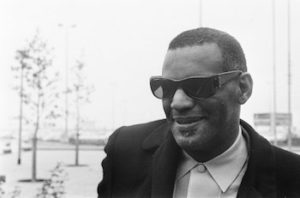
Ray Charles, 1968
Ray Charles, a Black singer, composer, and arranger, was born on this date in 1930.
Born in Albany, GA, Ray Charles Robinson was raised in Greenville, FL. It was in Florida that he became friends with a piano-playing neighbor. As a youngster, Charles studied with him at his small store-cum-juke joint and absorbed and digested the blues, boogie-woogie, and big-band swing records on his jukebox. At age six, Charles contracted glaucoma, which eventually left him blind. As a result, in 1936, he began a nine-year stay at the St. Augustine School for the Deaf and the Blind. He was still at school at 15 when his mother died (followed two years later by his father).
At St. Augustine School, Charles studied composition and mastered a variety of instruments, including piano and saxophone. From there, he played in several bands around Florida. Charles eventually led a jazz-blues trio that worked the West Coast in the style of Nat "King" Cole and Charles Brown. After releasing singles for labels such as Downbeat and Swingtime, Charles wound up on Atlantic Records in 1952. It was an ideal match between artist and label, as both were beginning to find their true identity.
With artistic control at Atlantic after demonstrating his skills as an arranger, he released "Things That I Used to Do," the biggest R&B hit of 1954. Charles responded with a string of recordings where he truly found his voice. This extended his streak, which carried him through the end of the decade, and included such R&B greats as "I Got a Woman," "Hallelujah I Love Her So," "Drown in My Own Tears," and the feverish call-and-response classic "What'd I Say." All were sung in Charles' gruff, soulful voice and accompanied by his piano and a horn section. While recording for Atlantic Records during the 1950s, the innovative singer, pianist, and bandleader broke down the barriers between sacred and secular music.
Charles displayed his genius by combining elements of gospel and blues into a spirited, exuberant style that came to be known as Soul Music. Just what is the soul, according to Ray Charles? As he told Time magazine in 1968, "It's a force that can light a room. The force radiates from a sense of selfhood and a sense of knowing where you've been and what it means. Soul is a way of life, but it's always the hard way." Many musicians and artists possess elements of genius, but Charles truly and completely embodied the term bestowed upon him as a nickname.
The gospel sound he'd heard growing up in the church found its way into the music he made as an adult. In his own words, he fostered "a crossover between gospel music and the rhythm patterns of the blues." After his Atlantic years, Charles moved to ABC/Paramount, where he claimed greatness with his "Modern Sounds in Country and Western Music," an album that topped the Billboard chart for 14 weeks in 1962. Over the decades, country western and big-band jazz elements have also infused his music. He was as complete and well-rounded a musical talent as this century has produced.
In the 1980s, Charles was often in the public eye on television and the movies. He had several albums and performed duets with well-known musicians, including Willie Nelson, Chaka Khan, and the Blues Brothers. His appearance on the 1985 release of "We Are the World" renewed interest in much of his work. He was inducted into the Rock & Roll Hall of Fame in 1986.
During the 1990s, he continued to write and perform, and in 1992, President Bill Clinton awarded him the National Medal of Arts. Charles was one of the most important influences on popular music. His passionate singing and intelligent melding of different genres remain the ideal by which many musicians continue to gauge their work.
In 2003, Charles performed "Georgia On My Mind" and "America the Beautiful" at a televised annual electronic media journalist banquet held in Washington, D.C. Ray Charles' final public appearance came on April 30, 2004, at the dedication of his music studio as a historic landmark in Los Angeles.
As executive director of The African American Registry, my favorite song performed by him is “Old Man River.” Ray Charles died of liver disease in Beverly Hills, CA. on June 10th, 2004.
Heart & Soul
A Celebration of Black Music Style in America, 1930-1975
by Merlis Davin Seay, Foreword by Etta James
Copyright 2002, Billboard Books
ISBN 0-8230-8314-4